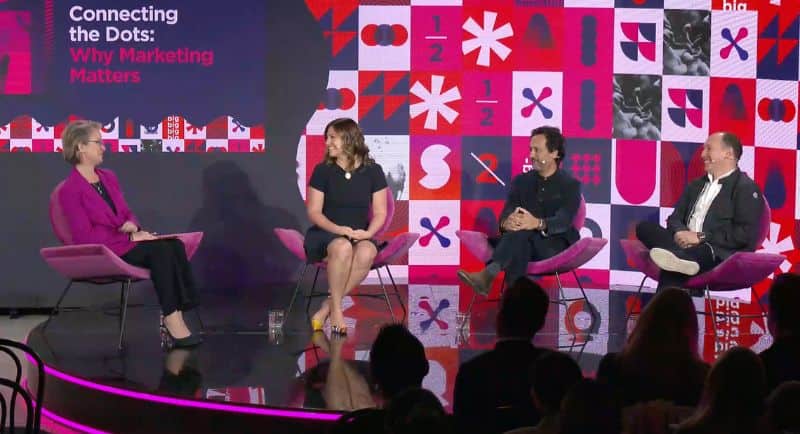Nine has swung open the door on its sixth Big Ideas Store, launching a week of speakers, workshops, research, and an immersive pop-up taking over the Beta events space in Sydney.
Mediaweek will be across all the week’s sessions, bringing readers a rundown of every idea – big or small.
Find out more about The Big Ideas Store here.
See Also: Nine’s Big Ideas Store 2023: Day Two recap
See Also: Nine’s Big Ideas Store 2023: Day One recap
See Also: Nine’s Big Ideas Store 2023: Day Three recap
Connecting the Dots: Why Marketing Matters
By Alisha Buaya
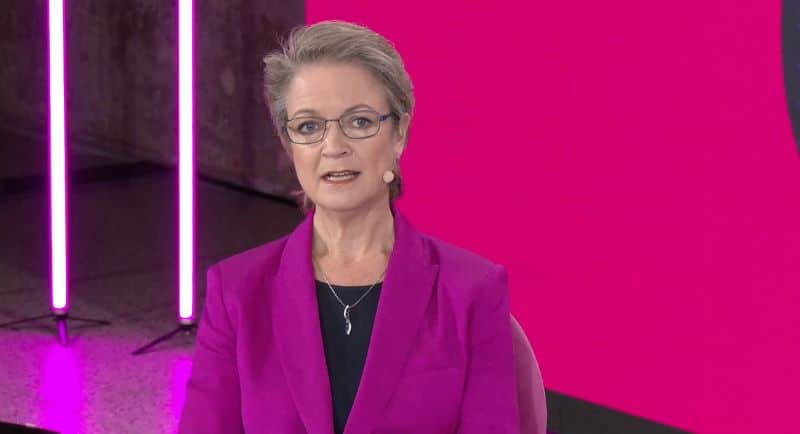
Nikki Kenyon
Kicking off the fourth morning of The Big Ideas Store was Connecting the Dots: Why Marketing Matters.
The discussion centred on the importance of investing in marketing and how it helps ride out challenging times. C Suite leaders shared how they justify their existence and connect the dots between marketing and business growth.
The discussion was led by Nikki Kenyon, director of Powered, featuring Marissa Pace, chief marketing officer at Rugby Australia, Mike Rebelo, CEO of Publicis Group Australia and New Zealand and Mike Napolitano, group managing director at DDB Melbourne.
On the topic of what skills marketers of the future are going to need to develop in order to stay relevant in business, Napolitano highlighted that amid new technology and innovation, the need to have a deep obsession for the customer as an important aspect.
In addition, he also noted the importance of being a specialised general in marketing amid traversing so many different areas of marketing and the technology that’s required to build one-to-one relationships with the customer.
“There are so many different things that marketing is asked of these days that you still need to be a specialised generalist.”
Napolitano added: “If you want to be a specialist, pick the area that you love the most and pick the area that you’re least interested in, and then deep dive into those two. You’ll come out with a balanced perspective, more or less than a skill, but more of an attitude of remaining adaptive.”
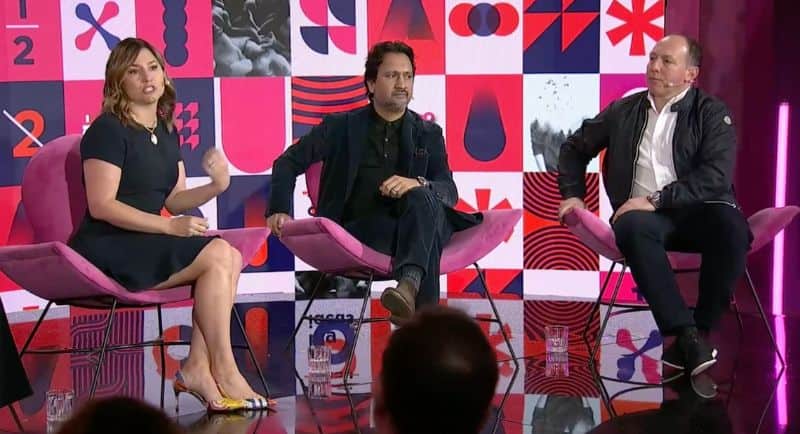
Marissa Pace, Mike Rebelo, and Mike Napolitano
When asked about how educating the business to understand the link between market marketing spend and results, Pace noted that it is a big challenge to convince others in the C suite that marketing is not seen on a strategic level of the business but rather as a service that can be cut.
“You have to put the knowledge back into the business, for any CFOs that are watching, as you grow a marketing team, you have to put more money into the pot because there’s more ideas that can be generated to do what you guys are talking about.”
Elsewhere in the discussion, Rebelo noted the importance of accountable marketing and the discussions around that flow down to junior marketers in organisations.
“We have these high-level conversations about objectives and results with the C suite and the senior people within our organisations. We’re not actually teaching the younger people within our organisations how to actually look for great objectives and how to then match those objectives to the results that are actually coming through and I think that’s critical.”
Cultural Conversations: I Am What I Am – Identity and Brands
By Alisha Buaya
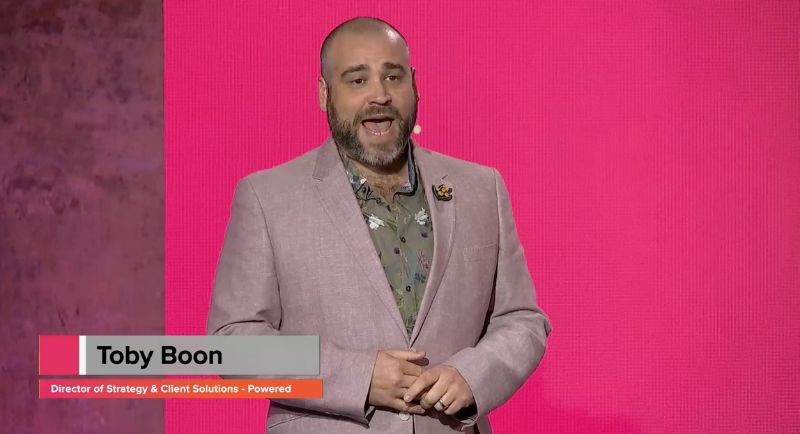
Toby Boon, Powered’s director of strategy and client solutions, kicked of the next discussion panel, Cultural Conversations: I Am What I Am – Identity and Brands.
The title of the panel shared the name of new research that explores how consumers live their identity, the role that brands play in supporting those identities, and their self-expression.
The discussion covered all angles from inclusion to increased personalization in the products and services that consumers engage with.
Boon said: “Brands and media occupy an interesting space with the ability to act as a conduit between the local and the niche.
“Mainstream brands and media play a role in reinforcing the credibility of different attributes of our identity through different modes of representation.
“Exposure through mainstream channels is powerful and can normalise and give greater understanding and acceptance to identities that individuals may not feel initially comfortable with.
Boon added: “71% of Australians consider themselves to be a work in progress. brands can help clear the way by providing knowledge or support or alleviating fear and offering a safe space of belonging.”
Jessica Parry, head of Powered Studios, moderated the panel discussion, which featured Loren Watling, from market research company Fiftyfive5, Married At First Sight participant Sandy Jawanda, author and commentator Maria Thatill and Stewart Gurney, chief strategy officer at Kaimera.
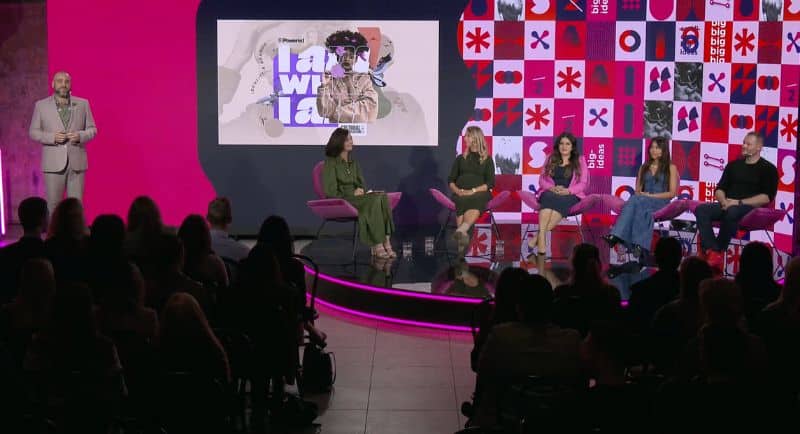
Toby Boon (left) presenting Jessica Parry, Loren Watling, Sandy Jawanda, Maria Thatill and Stewart Gurney
Watling shared that what surprised her about the research was finding that people are still working out who they are well into their 50s or 60s or 70s, despite the stereotype of that identity evolution happening earlier on in life. She also highlighted how consumers consider and purchase from brands they believe show support and represent in a true and authentic way.
For former MAFS participant Jawanda, she noted showing her wedding customs on a national mainstream audience was something that took a lot of courage for her and gave her a lot of pride.
“I think, looking back at it, there’s that fear that you don’t want to go on a platform like that and disrespect anyone and your culture. That’s what I want to change. Be authentic to yourself, who you are, what your story is. Hopefully, it’s going to pave the path for others to do the same thing.”
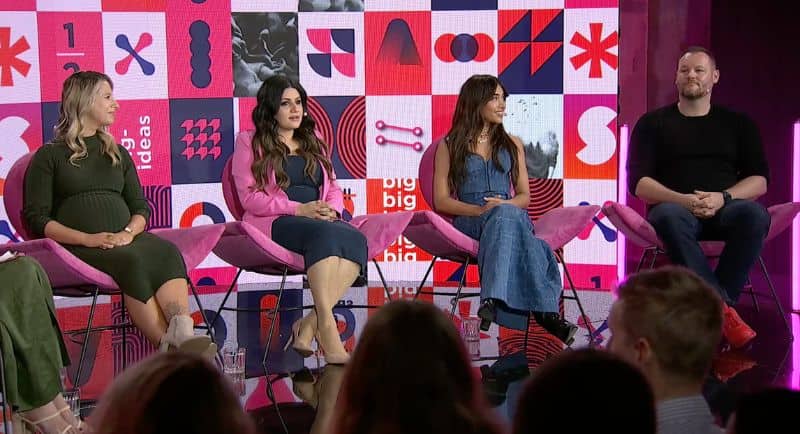
Loren Watling, Sandy Jawanda, Maria Thatill and Stewart Gurney
Thatill, a daughter of Indian immigrants, shared her experience with peripheral influence.
“It was those things that had subconsciously convinced me that to be Australian enough, I needed to give up the parts of me that were Indian because you didn’t have representation of people like me on TV, reading the news celebrated as Australia’s idea of beautiful.
After going journeying through the ideas of beauty in her teens and early 20s, Thatill shared that through her realisations, she embraced herself.
“I was convinced that my cultural identity required me to shed myself when it is hybrid. That is the story of so many Australians who are kids of immigrants, that third culture, kids, they’re indigenous. That is what it should look like,” she said
Gurney noted that in terms of messaging identity authenticity, advertisers have the opportunity to connect with consumers on a very different emotional level, he said: “I think that’s a really powerful creative space for lots of brands to operate in.”
Gurney also added: “I think, also, the idea of having a finished product and a finished idea has gone to the wayside. Now things can be evolved, consumers want to get involved in stuff, they want to help develop ideas, and they want to be part of that conversation. So having consumers involved in developing ideas is an important thing to do as well.”
See Also: The Big Ideas Store: The tightrope of reflecting people’s identity
The Great Debate: You Can Be Cautious or Creative, You Can’t Be Both
By Tess Connery
One of the highlights of Nine’s Big Ideas Store every year is The Great Debate, and this year was no different.
Moderated by Unmade’s Tim Burrowes, the topic was set: You can only be cautious or creative, you can’t be both. Arguing for the affirmative were Michele O’Neill (director of brand, Nine), Remi Baker (head of strategy, PHD Sydney), and James McManus (executive creative director, Pedestrian Group). On the bench for the opposing side were Joshua Green (strategy director, Spark Foundry), Toby Boon (director of strategy and creative solutions, Powered), and Pia Coyle (managing director, PHD Sydney).
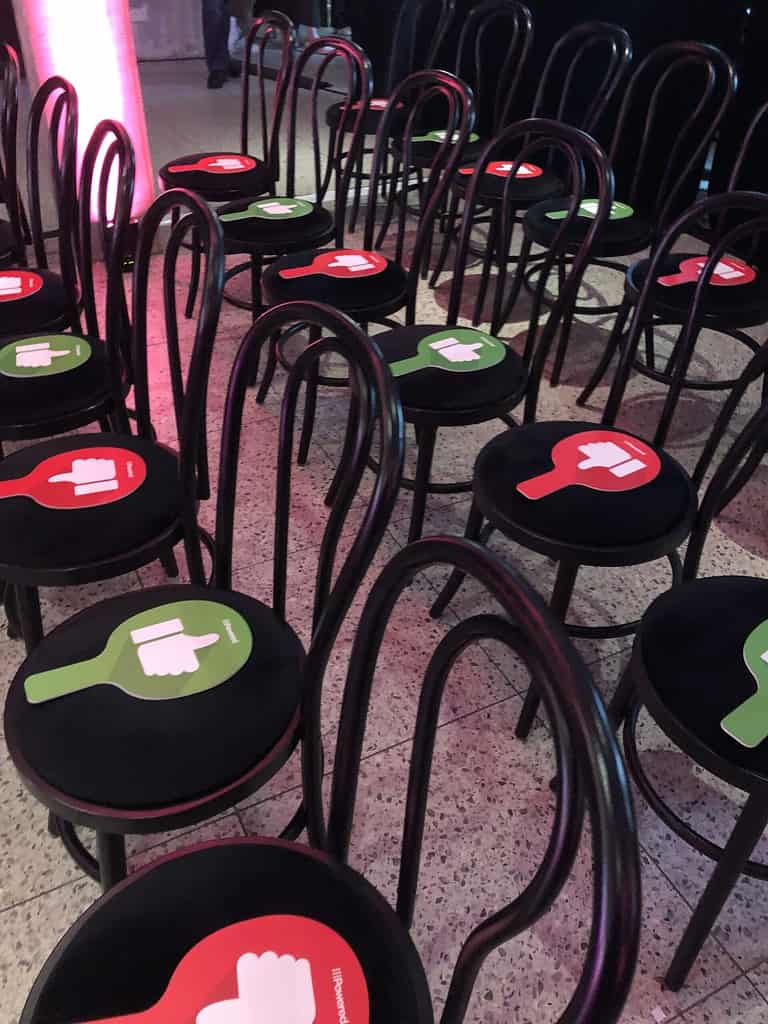
Paddles for the audience to cast their vote
Up first was O’Neill, who told the room about American art director George Lois, who was the man behind the inspiration for the topic. “George was very specifically referring to the marketing monoliths at the time who were buying up all the big agencies in New York, and who he thought would soon be running the world,” she said. “He was worried about death to the independents.”
After joking that the real fight here was between himself and Boon over who had the better jacket, Green then opened for the opposition. He pointed out that “The Statue of David wouldn’t exist without some pretty cautious scaffolding, War and Peace wouldn’t exist without some rigorous adherence to conventions of language and literature, and to give you a more contemporary example, the season two finale of The White Lotus wouldn’t exist without some very, very careful stuntwork from Jennifer Coolidge.”
Baker then took to the stage, using an example of a new raspberry-flavoured tea to argue that “when caution enters the room, creativity makes a swift exit.”
Arguing that creativity and caution could work well together, Boon then used the example of the Coca-Cola campaign that saw people’s names printed on Coke cans, and highlighted the caution and research that had gone into making that campaign as successful as possible.
It was time for the stunts portion of the evening, with McManus opening his time with a catwalk, and answering a phone call to joke that “It’s not you, I’ve chosen creativity for the evening, I can’t have both,” before telling the room about how creativity powers Pedestrian Group’s content. “Do not proceed with caution. I can’t think of one example of someone who should have 100% prioritised caution,” he said.
Wrapping up the arguments was PHD’s Pia Coyle, who had what was described as “the quote of the day” with “Let’s be super clear. Expressing caution does not mean we’re not being brave, it means we’re being prudent and brave. You can have epic sex wearing a condom!”
With the arguments made, the decision was handed over to the room and the online viewers. The resounding win fell in favour of the opposition – it turns out you CAN be cautious and creative.
